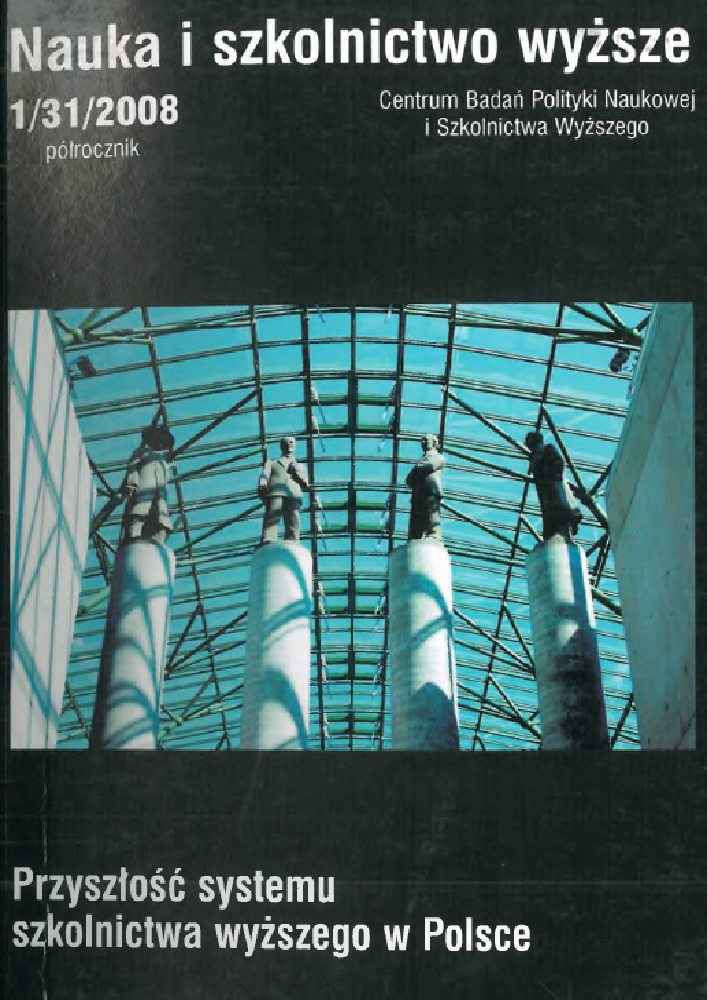Abstract
The author presents challenges to science and technology (S&T) statistics concerning, above all, issues such as statistics of innovation, measurement of knowledge investments, all of which are important components of knowledge-based economy statistics and human resources for S&T statistics (HRST). The introduction mentions the 50th anniversary of R&D statistics, celebrated in 2007 by OECD, as an international effort based on agreed methodological recommendations. OECD is the main international co-ordinator of work aimed at developing the methodology of S&T statistics, now gradually transforming into knowledgebased economy statistics. The paper moves on to discuss the key changes to the methodology of innovation surveys made in the third edition of the Oslo Manual (2005). What deserves particular attention is the new typology of innovation, covering not only technological product and process innovation but also organisational and marketing innovation. The section on measurement of knowledge investment presents OECD’s current methodology as well as selected relevant data published by this organisation. It is remarked that the measurement of the value of investment poses serious methodological challenges which have not been satisfactorily addressed in practice due to unavailability of relevant statistics. Three subsequent sections of the paper are devoted to statistics of human resources for science and technology (HRST). Detailed discussion is offered of the new international research undertaking on an unprecedented scale i.e. the CDH project implemented jointly by the European Commission (Eurostat), OECD and UNESCO (UNESCO Institute for Statistics). The aim of the project is to develop an international methodological standard to study careers of doctorate holders (CDH) and to include the largest possible number of countries in this study. The paper also mentions a Polish pilot study on CDH conducted in Q4 of 2007 by the Information Processing Centre (OPI), a body which reports to the Polish Ministry of Science and Higher Education. The summary section presents good practice of using S&T statistics in research and in S&T policy. The main element mentioned here is the use of metadata (or information on information) which now represent an integral element of data in contemporary statistics.
References
Ahmad N. 2003 Measuring investment in Software, STI Working Paper 2003/6, OECD, Paris.
Bryant K., Wells A. (red.) 1998 A New Economic Paradigm? innovation-based Evolutionary Systems, Discussions of Science and Innovation Series, Department of Industry, Science and Tourism (DIST), Canberra.
Eparvier R 2007 R&D Indicators to Monitor the European Research Area, Workshop on R&D Indicators to Monitor the European Research Area - ERAWATCH Workshop, Institute for Prospective Technological Studies, Sewilla, 14-15 maja 2007.
Jankowski J.E. 2001 A Brief Data-informed History of Science and Technology Policy, w: M.R Feldman, A.N. Link (red.): innovation Policy in the Knowledge-based Economy, Kluwer Academic Publishers, Boston - Dordrecht - London.
Kahn M. 2001 Investment in Knowledge, „STI Review”, nr 27 (OECD, Paris).
Key Figures 2005 Key Figures, European Commission, DG Research, Brussels.
Mapping Careers... 2007 Mapping Careers and Mobility of Doctorate Holders: Draft Guidelines, Model Questionnaire and Indicators - The OECDIUNESCO Institute for Statistics/Eurostat Career of Doctorate Holder (CDH) Project, STI Working Paper 2007/6, Statistical Analysis of Science, Technology and Industry, DSTI/DOC(2007)6.
Methodology Report... 2005 Methodology Report on European innovation Scoreboard, May 20, 2005, European Trend Chart on innovation, European Commission - Enterprise Directorate-General, Brussels.
Nelson R., Winter S. 1982 An Evolutionary Theory of Economic Change, Belknap Press of Harvard University Press, Cambridge, Massachusetts.
OECD 2007 OECD Science, Technology and Industry Scoreboard, OECD, Paris.
Rademacher W., Schnorr-Backer S. 2005 Knowledge Economy - Challenges for Official Statistics, Eurostat Conference „Knowledge Economy - Challenges for Measurement”, Luxemburg, 8-9 grudnia 2005.
Report... 2007 Report from the Commission to the Council and the European Parliament on the Implementation of Decision No 1608I2003IEC of the European Parliament and of the Council, Commission of the European Communities, COM(2007) 801 final, Brussels, 14 grudnia 2007.
Romer R 1986 Increasing Returns and Long-run Growth, „Journal of Political Economy”, nr 94(5).
Science... 2007 Science, Technology and innovation Indicators in a Changing World - Responding to Policy Needs, praca zbiorowa (wybór referatów z konferencji Blue Sky Forum II w Ottawie, wrzesień 2006 r.), OECD, Paris.
Statistics on Science... 2007 Statistics on Science, Technology and innovation - Current Situation and the Way Forward, Doc. EurostatlF4ISTII2007l3_DG RTD, Working Group Meeting on Statistics on Science, Technology and innovation, Luxemburg, 5-6 listopada 2007.
Stehr N. 1996 Knowledge as a Capacity for Action (referat prezentowany podczas konferencji Blue Sky I „New Indicators for the Knowledge-based Economy”, Paryż, 19-21 czerwca 1996 r.), Research Paper, Statistics Canada.
